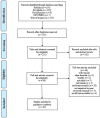Mood and anxiety disorders within the Research Domain Criteria framework of Positive and Negative Valence Systems: a scoping review
- PMID: 37333832
- PMCID: PMC10272468
- DOI: 10.3389/fnhum.2023.1184978
Mood and anxiety disorders within the Research Domain Criteria framework of Positive and Negative Valence Systems: a scoping review
Abstract
Introduction: While a growing body of research is adopting Research Domain Criteria (RDoC)-related methods and constructs, there is still a lack of comprehensive reviews on the state of published research on Positive Valence Systems (PVS) and Negative Valence Systems (NVS) in mood and anxiety disorders consistent with the RDoC framework.
Methods: Five electronic databases were searched to identify peer-reviewed publications covering research on "positive valence" and "negative valence" as well as "valence," "affect," and "emotion" for individuals with symptoms of mood and anxiety disorders. Data was extracted with a focus on disorder, domain, (sub-) constructs, units of analysis, key results, and study design. Findings are presented along four sections, distinguishing between primary articles and reviews each for PVS, NVS, and cross-domain PVS and NVS.
Results: A total of 231 abstracts were identified, and 43 met the inclusion criteria for this scoping review. Seventeen publications addressed research on PVS, seventeen on NVS, and nine covered cross-domain research on PVS and NVS. Psychological constructs were typically examined across different units of analysis, with the majority of publications incorporating two or more measures. Molecular, genetic, and physiological aspects were mainly investigated via review articles, primary articles focused on self-report, behavioral, and, to a lesser extent, physiological measures.
Conclusions: This present scoping review shows that mood and anxiety disorders were actively studied using a range of genetic, molecular, neuronal, physiological, behavioral, and self-report measures within the RDoC PVS and NVS. Results highlight the essential role of specific cortical frontal brain structures and of subcortical limbic structures in impaired emotional processing in mood and anxiety disorders. Findings also indicate overall limited research on NVS in bipolar disorders and PVS in anxiety disorders, a majority of self-report studies, and predominantly observational studies. Future research is needed to develop more RDoC-consistent advancements and intervention studies targeting neuroscience-driven PVS and NVS constructs.
Keywords: Negative Valence Systems (NVS); Positive Valence Systems (PVS); Research Domain Criteria (RDoC); anxiety disorders; mood disorders; scoping review.
Copyright © 2023 Böttger, Förstner, Szalek, Koller-Schlaud, Rapp and Tschorn.
Conflict of interest statement
The authors declare that the research was conducted in the absence of any commercial or financial relationships that could be construed as a potential conflict of interest.
References
-
- Arksey H., O'Malley l. (2005). Scoping studies: Towards a methodological framework. Int. J. Soc. Res. Methodol. 8, 19–32. 10.1080/1364557032000119616 - DOI
Publication types
LinkOut - more resources
Full Text Sources
Research Materials
Miscellaneous


